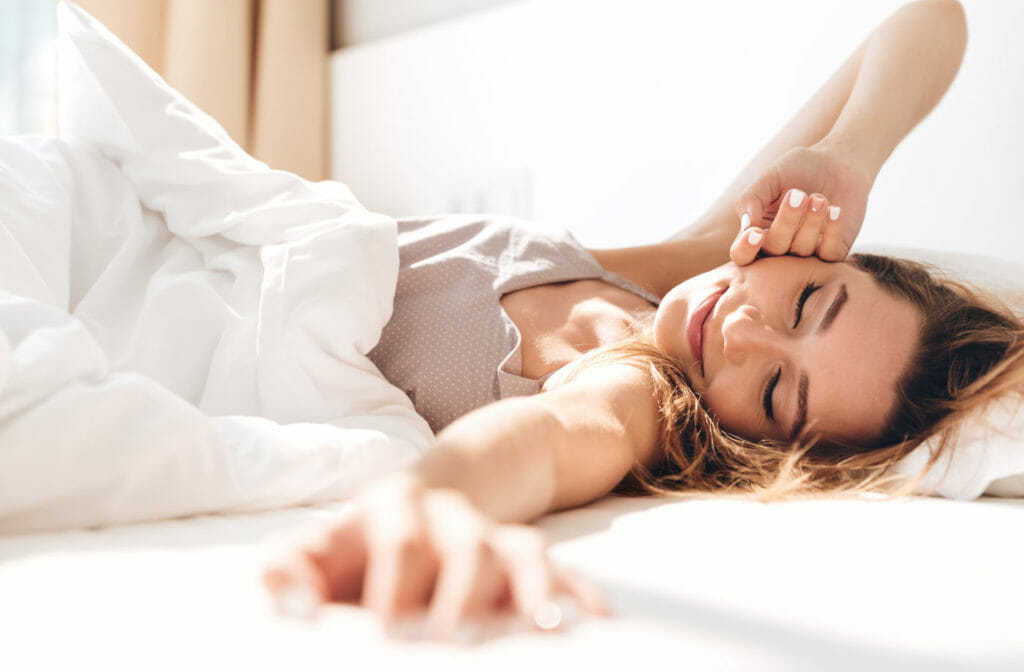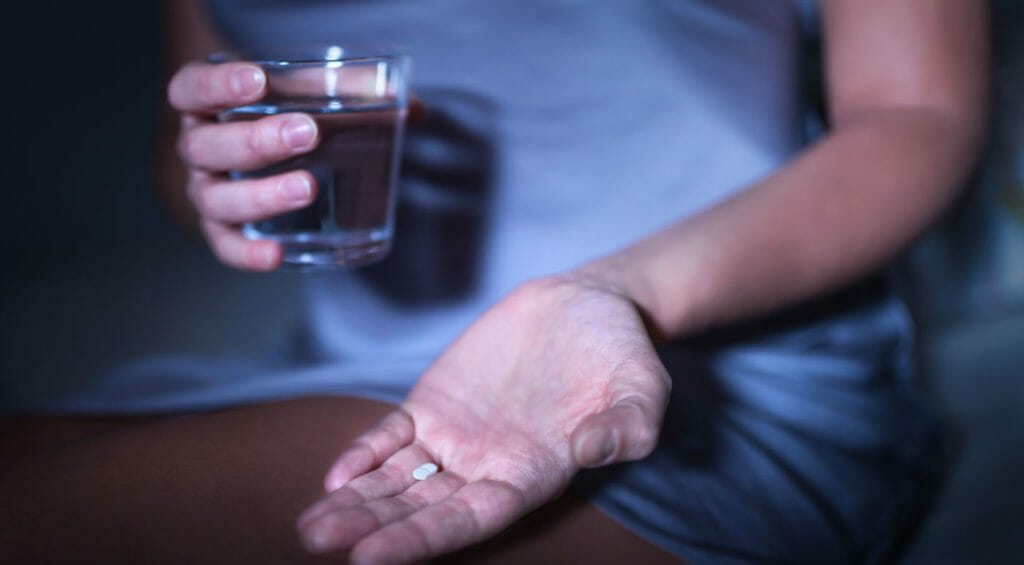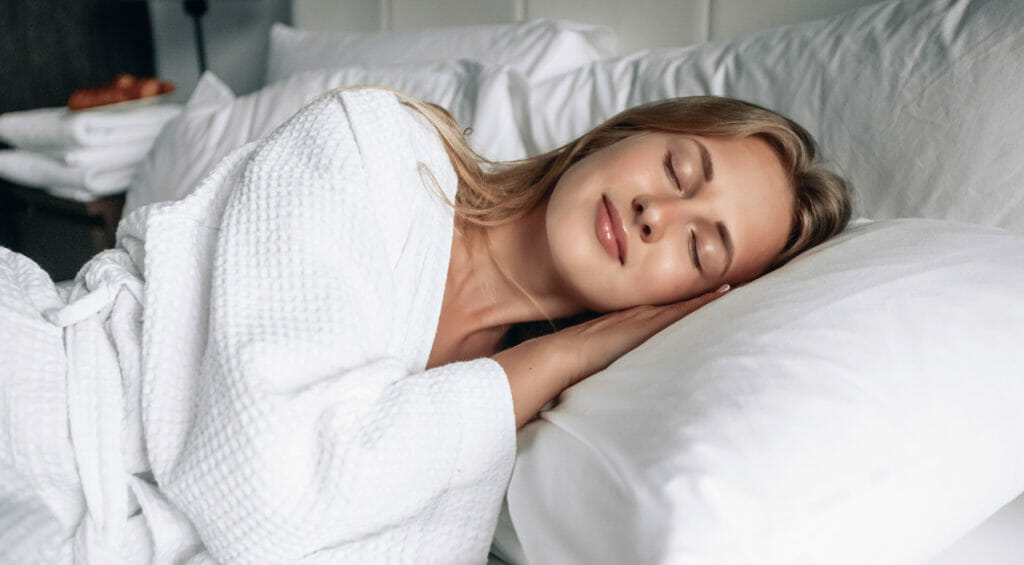
There is nothing worse than missing a good night’s sleep. If you’re like many Americans, you occasionally have difficulty falling and staying asleep. According to one consumer report, more than 68% of Americans report having trouble falling asleep more than one night per week.
Prescription sleep medications are commonly the first thing tried by individuals who repeatedly struggle with sleep concerns. Frequently, unpleasant side effects associated with taking prescription sleep medications include, but are not limited to:

- Burning or tingling in the hands, arms, feet, or legs
- Changes in appetite
- Constipation
- Diarrhea
- Difficulty with balance
- Dizziness
- Daytime drowsiness
- Dry mouth or throat
While there are times to use prescription sleep medications, these medications should not be the first treatment tried to resolve sleep concerns. According to the latest statistics, only 4.5% of Americans who suffer from sleep concerns such as insomnia or difficulty falling asleep utilize complementary and alternative medicine (CAM). Of the people who reported that they used CAM for sleep concerns, most said these therapies were helpful.
While choosing the right mattress can help improve your sleep, what if you’ve already found the perfect one?
DISCLAIMER: Before starting to take a new supplement, talk to your doctor about the safety of each supplement and possible side effects that may occur.
Many supplements claim effectiveness in treating sleep concerns. But which supplements and techniques are supported by research and practicing doctors in the sleep field? Below are listed the top five natural sleep aid supplements.
Melatonin

One of the most commonly used and talked about sleep-promoting supplements on the market is melatonin. Melatonin is a naturally occurring hormone that’s produced by the pineal gland, which is located in the middle of the brain. Melatonin is released naturally at night on a daily (circadian) rhythm. Melatonin is the primary hormone that tells your body that it’s time to go to sleep.
Since melatonin is released at night, this is the time when the levels are highest. Melatonin levels also increase during certain seasons of the year, such as autumn and winter, when times of daylight are shorter and nights are longer. The pineal gland and another region of your brain that detects external light sources (the suprachiasmatic nucleus) work in conjunction to signal your mind and body to shut down and sleep.
There are many reasons people have difficulty falling and staying asleep, but taking melatonin at night may be the answer to your sleepless nights. Taking melatonin 30 minutes before bedtime can increase the total level of melatonin circulating throughout your system, sending the message to your brain and the rest of your body that it is time to sleep.
Since your pineal gland works in conjunction with your suprachiasmatic nucleus, which detects light, remember to turn off all light sources for a better night’s sleep.
Melatonin has other functions that are still being discovered. What we do know is that melatonin acts as an antioxidant and is also anti-inflammatory, so this hormone not only helps you get to sleep, but keeps you healthy in other ways as well.
Dose:
Follow the directions for dosing on your melatonin supplement, but the usual doses of melatonin taken by individuals for sleep difficulty are 1 mg, 3 mg, 5 mg, and 10 mg (depending on your individual needs).
Safety:
Melatonin is LIKELY a safe supplement to take orally when taken SHORT TERM. According to Web M.D., the supplement, melatonin, should never be taken for more than 2 years. Minimal side effects are known to occur when taking too much melatonin, most of which involve feeling groggy the next morning. Do not operate heavy machine for four to five hours after taking this supplement. Before starting to take a new supplement, talk to your doctor about the safety of each supplement and possible side effects that may occur.
Magnesium L-Threonate

Magnesium may be one of the most underrated supplements on the market for sleep. Magnesium is involved in hundreds of chemical reactions in the body, so it should be no surprise that magnesium can help with sleep.
Most Americans receive most of their magnesium intake from green leafy vegetables, such as spinach and kale. Those who tend to avoid green leafy vegetables at all costs are missing out on the benefits of magnesium and other important minerals.
One way magnesium works is by causing the release of a brain chemical (neurotransmitter) called GABA (gamma-aminobutyric acid). GABA is a chemical that induces relaxation and decreases brain activity, which is helpful for individuals who have difficulty sleeping due to racing thoughts.
Magnesium comes in many forms—including magnesium malate, magnesium citrate, and magnesium L-threonate, as well as others. Choosing the magnesium L-threonate form is essential if you are using this supplement for sleep or other brain concerns, because the threonate part of this supplement allows it to cross the blood-brain barrier. The brain is selective about the chemicals it will allow inside, which is why choosing the right form of magnesium is crucial to treating your sleep concern.
Dose:
Follow the directions for dosing on your magnesium L-threonate supplement bottle. The most common dosages of magnesium L-threonate taken by individuals for sleep difficulty are 1,500 – 2,000 mg taken in divided doses throughout the day (depending on your individual needs).
Safety:
According to Web M.D., most folks get more than enough from their food intake and excessive use of magnesium supplements can be toxic. The most common side effects of excess magnesium consumption are diarrhea and feeling tired. Magnesium supplementation can be of particular concern for individuals with heart conditions such as arrhythmias. Before starting to take a new supplement, talk to your doctor about the safety of each supplement and possible side effects that may occur.
Valerian Root

One of the most common botanicals used for sleep concerns is valerian root (Valeriana Officinalis). This plant is found in many sleep supplements on the market today. The root is the part of the plant that’s utilized to make herbal supplements.
Valerian root works by attaching to the same receptors that benzodiazepines (anxiety-reducing pharmaceuticals) do, although weakly. You don’t have to worry about becoming addicted to valerian root, as can happen with benzodiazepines, because valerian root is non-addictive. Valerian root also stimulates GABA production, like magnesium L-threonate does.
Research indicates that valerian root increases overall sleep quality, reduces the time it takes to fall asleep, and decreases episodes of waking throughout the night. Waking with a groggy sensation in the morning is a common side effect of taking most sleep medications.
Individuals who take valerian root for sleep, however, report that they do not wake up groggy, and they often report feelings of calmness throughout the day. This is because valerian root is also used for the treatment of anxiety since it acts similarly to a weak benzodiazepine, which are medications commonly used to treat anxiety.
Dose:
Follow the directions for dosing on your valerian root supplement bottle. The most common dosage of valerian root taken by individuals for sleep difficulty is 1 gram taken one hour before bedtime. This dose can vary, depending on your individual needs.
Safety:
Valerian root supplementation is LIKELY safe for most people. Studies, according to the Mayo Clinic, have not been conducted for use over a month at a time meaning that long term studies on valerian root have not been conducted. The most common side effects of excess valerian root supplementation is drowsiness. Rarely, some individuals will feel energized when taking this supplement.
If this occurs, valerian root is unlikely to aid you in falling asleep and should be discontinued immediately if you’re taking this supplement for sleep concerns. Before starting to take a new supplement, talk to your doctor about the safety of each supplement and possible side effects that may occur.
Lavender Pillows

Lavender is a scent most people can recognize even at a young age, but rarely do we think of lavender as a tool to aid us in getting and staying asleep. Lavender (Lavandula spp.) is a plant with flowers that range in color from blue to violet that release a strong, pleasant smell.
Many household products such as dish soap and laundry detergent are lavender scented because many people love the calming scent of this plant. Lavender is a particularly useful botanical for sleep when the sleep disturbance is due to restlessness or a racing mind.
Making a lavender pillow is an easy and quick way to improve the quality of your sleep. The first step is to find or create a small sack; a sock can work nicely for this project.
Fill the stocking or pouch with dried aromatic lavender buds, and tie off the sack with a rubber band or a piece of string. That’s it! It’s that simple. This lavender pillow is not actually a pillow, but can be placed close beside your bed or under your pillow.
The aromatic oils contained within the flowers are what give this plant both its distinctive smell and its sleep-promoting properties. The scent of lavender is soothing and relaxing, which is why some emergency rooms and hospitals use lavender (and other essential oils) to calm patients before seeing the doctor or going in for their procedure.
Dose:
There is no specific dose when using lavender as a lavender pillow.
Safety:
Lavender is a safe herb for most people when used in the form of a lavender pillow. Some individuals may be allergic to lavender or have an unpleasant reaction when they touch it. It goes without saying, if you are allergic to lavender, this is not the sleep aid for you.
It goes without saying that if you experience any adverse symptoms while using a lavender pillow, discontinue using the lavender immediately and seek medical help. Before using lavendar as a new supplement to aid in sleep, or using any herbal product, talk to your doctor about its safety and possible side effects that may occur.
5-Hydroxytryptophan (5-HTP)

5-HTP is an essential amino acid (a building block for chemicals and proteins in the body). The body cannot make 5-HTP, which means we have to obtain this amino acid through eating foods that provide it, such as meats and seeds.
5-HTP is used to make other molecules in the body and brain, including melatonin and serotonin. Earlier, we discussed melatonin and its importance in the initiation and maintenance of sleep. Serotonin is another molecule that’s important to sleep—and sleep-related concerns.
To illustrate how serotonin influences sleep, consider the treatment of depression. Individuals suffering from depression are often prescribed selective serotonin reuptake inhibitors (SSRIs), which effectively increase the amount of available serotonin in the brain.
Some of the most commonly reported side effects of SSRIs are fatigue and increased sleeping. This is because serotonin is essential for our sleeping brains. Low serotonin is one cause of insomnia. Not only is serotonin important for sleep in and of itself, but serotonin is also used to make melatonin—which means that without 5-HTP, there would not be serotonin, which could not convert into the melatonin that tells your body and brain to go to sleep.
Dose:
Follow the directions for dosing on your 5-HTP supplement bottle. The most common dosages of 5-HTP taken by individuals for sleep difficulty are 100 mg to 300 mg taken one hour before bedtime (depending on your individual needs).
Safety:
5-HTP supplementation is considered safe for most people. The most common side effects of excess 5-HTP supplementation are diarrhea, nausea, vomiting, and drowsiness. 5-HTP has the potential to significantly increase serotonin production in the brain, which can be dangerous for some individuals.
Certain medications increase serotonin and can interact with 5-HTP, leading to serious medical concerns. Before starting to take a new supplement, talk to your doctor about its safety and any possible side effects that may occur.
Quality Control and Supplements
Many manufacturers create and sell the supplements listed above—some with minimal oversight by regulatory bodies and agencies. Historically, there have been incidents where supplements were contaminated in various ways, causing illness and even death to some consumers.
For these reasons, it is recommended that you partner with a healthcare professional who is knowledgeable about supplement manufacturers and their manufacturing practices.
Certain healthcare professionals spend time vetting supplement manufacturers and ensuring third-party oversight concerning quality control. And many high-quality supplement manufacturers will only sell their products to healthcare professionals who have the expertise to prescribe these potent substances to treat specific disorders.
To minimize the risks of using sub-par supplements to help you get a good night’s sleep, be a wise consumer and perform due diligence when purchasing these products.